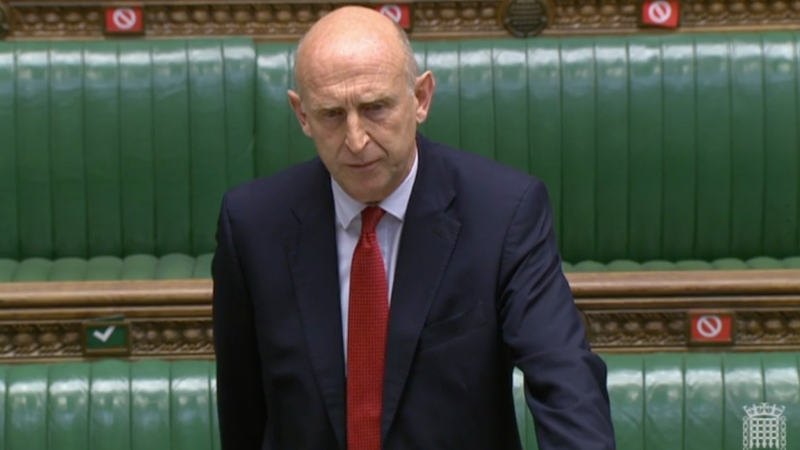
John Healey has declared that a government bill relating to British troops serving overseas “creates the risk that the very gravest crimes including torture and other war crimes go unpunished” – but Labour did not vote against it tonight.
In a parliamentary debate this afternoon, the Shadow Defence Secretary told MPs that the overseas operations bill “calls into question Britain’s proud commitment to the Geneva Convention” and “our moral authority”.
But Healey said he was certain the government would be “prepared to rewrite parts of this bill”, which seeks to exempt British armed forces personnel from prosecution under the European Convention on Human Rights.
Labour did not vote against the bill at second reading this evening, and it passed with 331 MPs voting in favour and 77 against. It will now proceed to committee stage, at which point Labour and other opposition MPs will attempt to amend the bill.
18 Labour MPs voted against: Diane Abbott, Apsana Begum, Olivia Blake, Richard Burgon, Ian Byrne, Jeremy Corbyn, Ian Lavery, Rebecca Long-Bailey, John McDonnell, Kate Osamor, Kate Osborne, Bell Ribeiro-Addy, Lloyd Russell-Moyle, Zarah Sultana, Jon Trickett, Claudia Webbe, Nadia Whittome and Beth Winter.
Most of the rebel MPs are now backbenchers, but Blake, Whittome and Winter were parliamentary private secretaries (PPSs) on the Labour frontbench. It is understood that frontbenchers were told they would be resigning their roles if they voted against the bill – though Whittome has said she did not intent to quit.
Momentum co-chair Andrew Scattergood commented: “Keir Starmer must not sack any Labour MP from his frontbench for standing up for basic human rights and the rule of law. It’s the role of the leadership to unite the party, sacking any of these MPs will simply fuel division.
“It’s shameful that Labour’s leadership didn’t oppose a bill which protects those who commit torture and other crimes against humanity.”
Speaking in the Commons today, Healey said: “The presumption against prosecutions for all crimes against sexual violence clearly creates the risk that the very gravest crimes including torture and other war crimes go unpunished.”
He argued that the proposed legislation would create a “triple lock” for troops and veterans, including a presumption against prosecution for alleged offences committed more than five years ago.
“The facts of this bill are that it now places torture and other war crimes on a different level to crimes of sexual violence. That is not embarrassing. That is unconscionable,” Healey later added. “Ministers must think again.”
The bill comes after 70% of allegations received by the Iraq historic allegations team were dismissed. Healey pointed out that the proposed legislation does not deal with investigations but only with “prosecutorial decisions and process”.
Labour’s spokesperson for defence and the armed forces went on to argue that “this is what the bill should deal with, can deal with, and our aim during its passage through parliament is to help make sure that it does”.
The Tories pledged in 2019 to tackle “vexatious claims” against armed forces personnel, such as those raised about the conduct of British troops during the Iraq war or Northern Ireland operations, but Healey noted that “nothing in this bill applies to Northern Ireland”.
Labour’s former shadow immigration minister Bell Ribeiro-Addy tabled an amendment to throw out the bill this evening. She argued on LabourList: “There’s nothing remotely patriotic about rejecting international law and decriminalising torture.”
The government has also faced resistance on the bill from within its own party. The senior Conservative MP and former cabinet minister David Davis said he is “deeply troubled” by the plans to “decriminalise torture by British personnel”.
The Law Society criticised the proposed legislation in advance of the debate this afternoon, saying that the bill “creates a special category of criminal case, hitherto unrecognised in UK law” and would deny victims access to justice.
Defence Secretary Ben Wallace attacked Labour over the Iraq war during the debate. His Labour opposite Healey replied: “That is not worthy of the office of the Secretary of State for Defence… This is too important for party politics.”




More from LabourList
‘Labour’s quiet quest for democratic renewal’
‘Labour promised to make work pay. Now it must deliver for young people’
‘Council Tax shouldn’t punish those who have the least or those we owe the most’